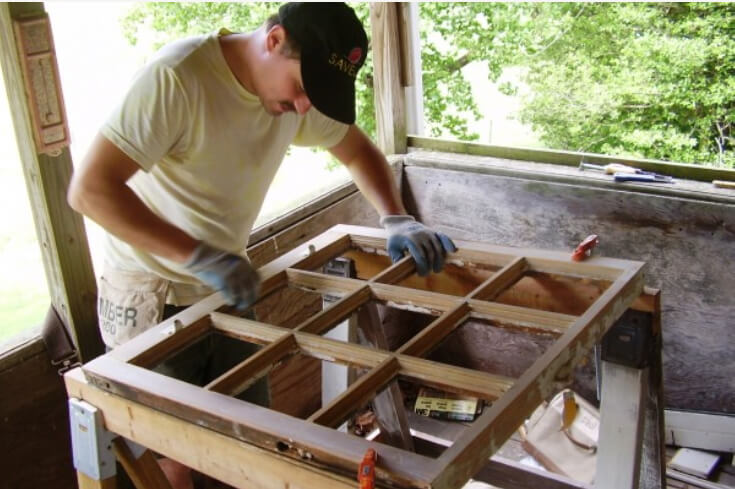In order to ensure the longevity of your wood window, one must abide certain maintenance practices. Below are a few of them.
- General care.
In order to extend the decorative finish of your wood window, endeavor to carry out simple general care such as wiping down the joinery finish. This helps to remove insect and dirt and gives the window a befitting look. This can be done simultaneously with the glass cleaning. You should also check the hinges and handles and remember to treat with oil if necessary. These practices help to extend repainting intervals.
- Restoration. In cases of restoration, there are basic steps that must be followed.
Step 1: Using a fine grade abrasive paper, lightly abrade the areas that need to be re-coated
Step 2: Wash with mild detergent and rinse with water. This helps to remove insect, dust and any other contaminants that may encourage algae and fungal growth.
Step 3: Using a good quality, synthetic brush built for acrylic paint, put a coat of water-based translucent or opaque topcoat in the right color, shade or gloss level.
Step 4: In the cases of multiple coats, allow each coat to dry before applying another layer.
- Applying water-based paints. Water-based paint has characteristics different from acrylic or other types of paint. Water-based paints have shorter drying time and have reduced flow. Below are the steps to achieve a good finish while using water-based paints.
Step 1: Get a synthetic brush with long bristles
Step 2: Insert the brush in water, from the base to the tips
Step 3: In order to improve flow, thin paint with 5-10% of water. This is particularly important in warm weather.
Step 4: Generously load the paint on the surface, brushing briskly
Step 5: Ensure not to over brush, water paint naturally flow and level up
Step 6: Do not paint seals
Step 7: If you have stained the glass with paint, allow the paint to dry. Then, wet the area and use a scraper to remove it. Not wetting the surface may lead to scratches on the glass.
Step 8: Work systematically; start and finish one component before moving to the next, e.g. start from the top rail, then move to the style and finish at the bottom rail.
Step 9: Ensure not to paint when the temperature is below 5 degrees Celsius or if the humidity is above 80% as this may affect the performance of the coating.
- Troubleshooting. In the case of damage, there are certain steps that must be followed to restore the window to its original condition. Follow these steps if minor flaking occurs but the timber substrate is still good.
Step 1: Using an abrasive paper, abrade the damaged area to take out all loosed coating so as to get a smooth surface
Step 2: Use water to remove dust from the abraded area and allow to dry properly
Step 3: Apply the topcoat to the damaged area in the appropriate color and gloss level
Step 4: Allow drying before adding another coat
https://generation.yumilkax.com
https://generationagency.com.mx
https://legendarytourism.com.mx
https://oasisagencytravel.com.mx
sekolah tinggi ilmu kesehatan ukpm
kebidanan mitra sejahtera jakarta
akademi analis kesehatan muhammadiyah surabaya
akademi kesehatan lingkungan sumsel
akademi kebidanan arta kabanjahe
akademi kebidanan nusantara medan
akademi kebidanan delhus delmed
akper harapan mama deli serdang
akademi kebidanan bunga bangsa aceh
polres batam
polres bima
polres dago
polres denpasar
polres dumai
polres jakarta
polres jambi
polres mataram
polres sabang
polres samarinda
ponpes BabulUlum
ponpes BaitilHikmah
ponpes BUDi IHSAN
ponpes Ponpes Darul Amilin
Ponpes Darul Hidayahul
ponpes Darul Khairat
ponpes Darul Makmur
ponpes Darul Mifathurrahmah
ponpes Darul Muhsinin
ponpes Darussalam nuh
ponpes dayah darul
ponpes Dayah Syaikhuna
ponpes IhyaUlumuddin*
ponpes Insan Madani
ponpes Jabal Rahmah
ponpes Liqaur rahmah
Ponpes Madinat Uddini Yahbabul
ponpes Mafatih ussaadah
ponpes Nurul Hudas
ponpes Nurul Yaqin tengku
ponpes RAHMATUL HIDAYAH
Ponpes Raudha Tulala
ponpes Tahfidzul Qua
Ponpes Thariqun Najah
PRSI aceh
PRSI bandung
PRSI banjar
PRSI bekasi






